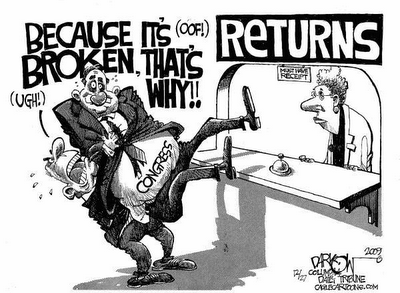
Chances are not great for Congress to unite for much of anything controversial in the current partisan environment. But Cuba legislation is making its way around, and we continue to watch its path.
The House this week mulled legislation that would lift the travel ban and remove some obstacles to agricultural sales. In a hearing convened by the Ways and Means Committee, representatives heard statements from John Block, Wayne Smith (Center for International Policy), Geoff Thale (Washington Office on Latin America), Jose Miguel Vivanco (Human Rights Watch), and Myron Brilliant (U.S. Chamber of Commerce) that all supported easing current trade and other restrictions, indicating that the U.S. embargo has served to isolate the United States internationally, not Cuba. Michael J. Kelly of Creighton Law was the one statement against lifting embargo restrictions, arguing that the outstanding claims to property that American citizens continue to hold against the Castro government—a result of appropriations after the 1959 revolution—should be rectified before any embargo changes are made.
Kevin Brady, a House Republican, backed Kelly up. “We must resolve the over six billion dollars in expropriation claims,” he said, “before developing a more robust economic relationship with a post-Castro democratic government in Cuba.” The hearing was called by Democratic Representative John Tanner, who argued on the other side: “Lifting these travel and trade restrictions is about what is best for the United States.”
The bill in question was put forth by House Agriculture Committee Chairman Colin Peterson, a Democrat, and Republican Representative Jerry Moran, and its merit has been backed up with data: a March study by Texas A&M University estimated that approving the Peterson-Moran bill to lift the travel ban and ease agricultural export restrictions could lead to $365 million in additional sales of U.S. goods and create 6,000 jobs in the United States. Not bad.
And the recent challenge issued by Cuba’s National Assembly President, Ricardo Alarcon, must be difficult to ignore. After Secretary of State Clinton’s cynical comment that the Castros deliberately provoke the United States during times of thaw in the relationship in order to maintain the embargo for their own purposes, Alarcon a week ago issued a public statement challenging Washington to lift the embargo, even for a year, to see whether it is in Cuba’s interest or in the interest of the United States.
Who can resist such a dare?